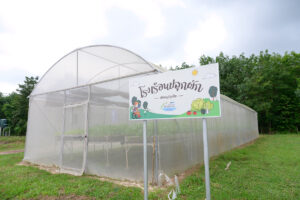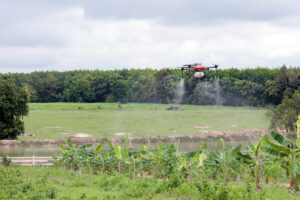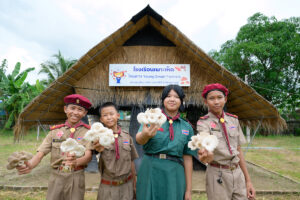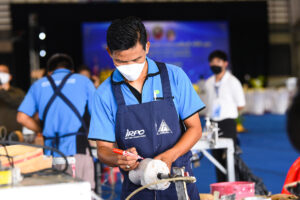Lamsaiyong Model and IRPC Smart Farming Project

The initiative is being implemented across three provinces—Buriram, Udon Thani, and Rayong—leveraging IRPC’s expertise in water resource management to address water scarcity in drought-prone areas. Efforts focus on developing and managing additional water storage facilities to support agricultural activities during the dry season.
Building on these foundations, the project integrates Smart Farming technologies to promote integrated agriculture tailored to the unique environmental conditions and way of life of each community. Guided by the principles of efficiency, simplicity, and maximum benefit, this approach ensures that solutions are both sustainable and practical, empowering local communities to enhance agricultural productivity while conserving natural resources.
-
Lamsaiyong Model and IRPC Smart Farming – Nang Rong District, Buriram Province
In 2014, IRPC Public Company Limited launched a water management and storage development project in drought-prone areas, originally named the “Create Canals, Create People” project, at Ban Nong Yang, Lamsaiyong Subdistrict, Nang Rong District, Buriram Province. The initiative aimed to address water shortages for agriculture and domestic consumption during the dry season.
With funding support from IRPC and in collaboration with the Foundation for Education and Public Assistance, five village reservoirs in Ban Nong Yang, covering a total area of 18 rai, were dredged to increase their depth and interconnected to expand capacity. As a result, water storage increased from 40,000 cubic meters to 90,000 cubic meters, serving as the raw water source for the village’s water supply system.
Additionally, IRPC released freshwater fish into the reservoirs to enhance the community’s natural food sources and generate income by allowing villagers and outsiders to fish in the reservoirs.
2015 – IRPC mobilized employee volunteers to repair and upgrade Ban Nong Yang’s water supply system, which previously produced water with high sediment content that was unsuitable for consumption. After improvements, the system was able to produce clean, safe water meeting quality standards. Volunteers also trained the community to maintain and operate the water system independently, ensuring a consistent supply of quality water.
2016 – The company installed HDPE water pipelines from Khlong Lamsaiyong to a 50-rai reservoir in Don Chon Forest, Lamsaiyong Subdistrict, which had been excavated by government agencies. A 4.2-kilowatt solar-powered pump system was also installed to transfer water from the public canal to the reservoir. This reduced the community’s electricity costs and enabled them to fully utilize the reservoir’s water resources.
2020 – In response to severe drought conditions that left Ban Nong Yang’s reservoirs insufficient, IRPC funded the drilling of two groundwater wells and installed 2.7-kilowatt solar-powered pump systems. This ensured access to water for domestic use, agriculture, and income generation while also reducing the community’s electricity expenses.
2022 – IRPC partnered with the Ban Nong Yang community to repair and restore the village’s water supply system, which had been in use for over 20 years and was deteriorating.
2023 – The company supported the establishment of a community enterprise to create jobs and generate income for local residents. As a result, the “Lamsaiyong Model Smart Farming Community Enterprise” was officially registered, strengthening the community’s capacity for sustainable development.
-
Lamsaiyong Model & IRPC Smart Farming – Ban Dung District, Udon Thani Province
2019 – Present
Since 2019, IRPC has been implementing the Lamsaiyong Model at the Udon Thani Center for the Promotion and Development of Persons with Disabilities — a site where the company had previously supported an occupational development project for persons with disabilities in 2017. Today, the center welcomes persons with disabilities and their caregivers to use the space for vocational training in agriculture and livestock farming.
To launch the initiative, the company deployed its volunteer engineers to design and carry out various infrastructure improvements. These included expanding agricultural water reservoirs, laying water pipelines, installing solar-powered water pumping systems, and constructing both ground-level and elevated water storage tanks. The team also upgraded restrooms to be accessible for persons with disabilities and added ramps for ease of mobility. Additional facilities were built, including poultry houses for egg-laying hens, a bio-compost facility, and a “cowboy fence” to clearly designate and separate farming and livestock areas.
2020
In 2020, the company designated the Udon Thani Center for the Promotion and Development of Persons with Disabilities as an ongoing site for its social responsibility initiatives. The aim was to position the center as a training and knowledge hub for agriculture and livestock farming for persons with disabilities, while also enhancing the center’s capacity for self-reliance. This included strengthening its capabilities in land management, income generation, and expense management to ensure sustainable operations.
2021
In 2021, the company advanced the project by integrating agricultural innovations and technologies tailored to the local community’s lifestyle and the capabilities of persons with disabilities. A 35-rai area within the Udon Thani Center for the Promotion and Development of Persons with Disabilities was designated as the IRPC Smart Farming site. This agricultural learning space is designed to welcome persons with various disabilities, the elderly, and caregivers of bedridden individuals, enabling them to acquire agricultural skills suited to their physical abilities and potential. The goal is to empower participants to generate sustainable livelihoods and incomes for themselves and their families.
The company provided support by sourcing practical, user-friendly agricultural technologies and innovations appropriate to the land conditions and the lifestyle of farmers with disabilities. The project’s vision was guided by the working principles of His Majesty King Bhumibol Adulyadej The Great (Rama IX): “Integrated agriculture with appropriate technologies for the area and the community’s way of life, grounded in the principles of economy, simplicity, and maximum benefit.”
This approach is combined with structured education, training, and knowledge-sharing from experts, thereby improving the quality of life of persons with disabilities. It creates opportunities for them to engage in agriculture as a viable profession, earn income, and produce high-quality, cost-effective yields.
Signing of the Memorandum of Understanding (MOU) on Academic Collaboration
IRPC Public Company Limited and the Faculty of Engineering at Kamphaeng Saen, Kasetsart University, signed a Memorandum of Understanding to jointly implement the IRPC Smart Farming Project at the Udon Thani Center for the Promotion and Development of Persons with Disabilities.
This collaboration focuses on the transfer of knowledge and the exchange of expertise in water management, crop cultivation development, and the app of agricultural innovations and technologies—core components of the IRPC Smart Farming initiative.The MOU covers a three-year period, from June 21, 2021, to June 20, 2024.
Driving the IRPC Smart Farming Project through Employment under PTT’s Restart Thailand Program
This initiative aims to stimulate the Thai economy and develop society by employing workers and newly graduated students (vocational certificate to bachelor’s degree) to join PTT Group’s “Innovation for Smiles” project (Smart Farming & Smart Marketing). IRPC was allocated six employees from the Restart Thailand program with skills in Smart Farming to work and help drive the IRPC Smart Farming Project at the Udon Thani Center for the Promotion and Development of Persons with Disabilities.
Excavating an agricultural water reservoir designed by company engineers to store water for farming within the IRPC Smart Farming project area (35 rai) and to reserve water for the Center during the dry season.
Constructing a fish pond and a chicken coop for egg-laying hens above the pond under the “Raise Chickens, Get Fish” plan. Raising chickens above the fish pond reduces fish feed costs, minimizes pollution from chicken waste, and lowers labor needs for cleaning and waste disposal. The coop was designed to meet health and hygiene standards.

Installing a solar power system with six 340W solar panels and a water pump to transfer water from the reserve reservoir to the fish pond, as well as distribute water to farming areas, livestock, and smart vegetable greenhouses. This addresses the problem of low and irregular rainfall in the area.
Building a vegetable greenhouse with an automated irrigation system connected to the solar panels to reduce electricity costs and labor for disabled caretakers. The goal was to test growing high-value vegetables during the rainy season by selecting crops that would otherwise be damaged by rain, thereby generating higher income during this period.

In 2022, additional IRPC Smart Farming activities included:
Renovating and extending an unused company office container for the Center, converting it into an office/meeting space with accessibility ramps, air conditioning, exterior lighting, and solar power installation.
Delivering the “Aiang Agriculture Spraying Drone” to the Center to enhance agricultural skills of disabled farmers by using technology to improve productivity. The drone is used to spray fertilizers, nutrients, and hormones, saving time and labor, and creating income opportunities for disabled operators who can offer spraying services.

In 2023, further developments included:
Widening the embankment of agricultural water reservoir no. 3 from 4 meters to 7.3 meters and raising the overflow pipe from 60 cm to 100 cm, doubling water storage capacity.
Installing water level measuring poles in all four reservoirs for water management.
Installing two 2,000-liter water tanks — one for drip irrigation in soil improvement test plots, and one for underground water supply to the chicken coop above the fish pond.
Testing degraded soil improvement using “White Bear” fertilizer.
Developing value-added agricultural products using a solar dryer, such as sun-dried fish and dried bananas.
Providing drone spraying services for rice paddies and field crops in Ban Dung District, Udon Thani, operated by disabled farmers.
In 2024, the project further included:
Testing degraded soil improvement using “White Bear” fertilizer and soil conditioners, as well as testing cultivation of Kluai Nam Wa Mali Ong bananas to further develop and increase the value of agricultural products.
-
IRPC Smart Farming, Rayong Province
The project began in 2022 under the name Integrated Agricultural Learning and Tourism Center, Suan Yai Da Che Boonchuen (IRPC Smart Farming), located in Tapong Subdistrict, Mueang District, Rayong Province. It is implemented in line with the company’s vision and mission, ensuring alignment with the goals and methods for achieving success under the 3S strategy (Strengthening the core, Striving for growth, Sustaining the future).

Details and Objectives
-
Implement the IRPC Smart Farming project according to a 3-year plan (2022–2025), driven by the IRPC Smart Farming Working Committee.
-
Carry out the project in collaboration with Suan Yai Da Che Boonchuen (Mrs. Boonchuen Phokaew) to foster participation and deliver benefits to Suan Yai Da, the local community, and the company.
-
Integrate the company’s knowledge and innovations to establish a learning hub for agriculture and agro-tourism, in connection with the IRPC Smart Farming project area in Udon Thani Province.
-
Create benefits for the Rayong community, with Suan Yai Da serving as the central point for the following activities:
-
Serve as a hub for receiving soil samples to analyze nutrient content, enabling farmers to apply fertilizers suited to their soil conditions.
-
Act as a distribution center for community products/goods.
-
Provide income opportunities for the community, such as employment in tourist services.
-
-
Serve as a study and testing site for the company’s White Bear fertilizer (Nano Zinc Oxide) to gather data for developing fertilizer/nutrient formulas, with the aim of gaining acceptance and expanding the company’s business in the future.





 In addition to being used for producing prosthetic legs at the Foundation’s office in Chiang Mai, IRPC’s plastic pellets are also supplied to the Royal Mobile Prostheses Unit, which operates across Thailand and in neighboring countries such as Malaysia, Myanmar, and Cambodia, as well as to 95 Royal Prostheses Manufacturing Units located in hospitals nationwide. Furthermore, they have been sent to prosthetic factories established by the Foundation at military hospitals in the Republic of Burundi and the Republic of Senegal—both economically disadvantaged countries where many people have lost limbs due to domestic unrest and other causes.
In addition to being used for producing prosthetic legs at the Foundation’s office in Chiang Mai, IRPC’s plastic pellets are also supplied to the Royal Mobile Prostheses Unit, which operates across Thailand and in neighboring countries such as Malaysia, Myanmar, and Cambodia, as well as to 95 Royal Prostheses Manufacturing Units located in hospitals nationwide. Furthermore, they have been sent to prosthetic factories established by the Foundation at military hospitals in the Republic of Burundi and the Republic of Senegal—both economically disadvantaged countries where many people have lost limbs due to domestic unrest and other causes.



